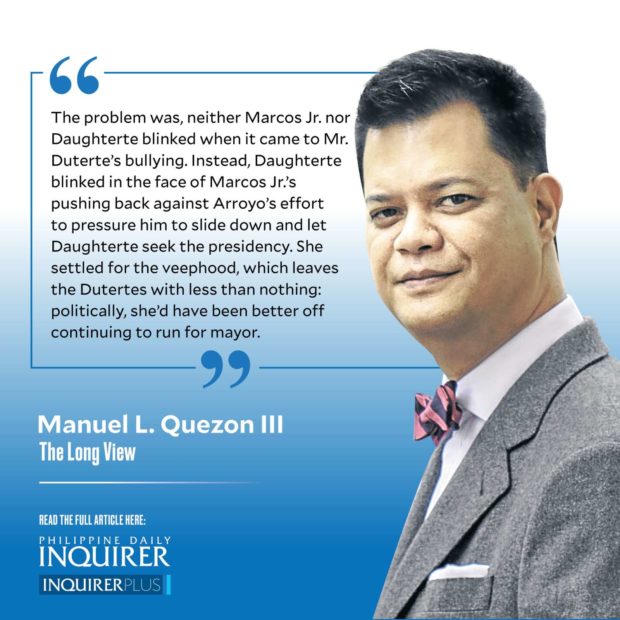Ever since we restricted presidents to a single, six-year term, the dilemma of an incumbent nearing their expiration date has been twofold. First, continuity is the toughest pitch to make to the voter in a national election because the one who ought to continue can’t be in contention. Second, since the race necessarily becomes one for a successor, an incumbent’s power of endorsement is weak, because nontransferable mostly, while in the ensuing electoral battle, the authority and resources of the incumbent evaporate as election day nears.
Going into September, the President showed every sign of bucking the 1998-2016 trend in which Ramos, Arroyo, and Aquino III all failed to significantly muster a successful succession operation. Then two things happened: the Pharmally probe, and the surveys, which set the stage for the looming filing of candidacies in October. The President, formerly unassailable, took a hit in his ratings; more to the point, his political heir, Sen. Bong Go, became entangled in the whole mess. To top things off, even Daughterte took a hit in the surveys.
The results played out from September to October. The trial balloon of a Go for president and Duterte for vice president was lowered. Instead of the President seeking the vice presidency, Go announced he was setting his ambitions lower to seek that post. Others proposed that the President, in turn, seek a seat in the Senate as a kind of insurance. This left the question of Daughterte seeking the presidency. But when the October deadline for candidacies loomed, she excused herself from the presidential proceedings. What followed was a mad scramble to produce placeholder candidates until the administration could get its act together.
As I’d suggested in this space, the President lashing out at the Marcoses was due to his realizing they now knew he needed them more than they needed him. Back in September, I pointed out the tensions between the President and the Marcoses after the President had taken pains to spell out the limited, user-friendly nature of his political relationship with the Marcoses, one he’d considered fully paid with the state funeral he’d granted the late dictator.
For her part, former president and speaker Gloria Macapagal Arroyo, with whom Daughterte had successfully engineered a congressional coup, was widely seen as brokering a deal in which Daughterte would seek the presidency and Ferdinand Marcos Jr. the vice presidency. This was obviously a problematic, not to mention humiliating, state of affairs for Marcos Jr., suggesting as it did his having to bow to the Dutertes and Arroyos.
Then the President got into the act. A bully more often than not relies on an already fearsome reputation to intimidate his targets into giving in. The past month, then, was about the President trying to bully Marcos Jr. to sliding down, and his daughter to sliding up, in the 2022 presidential and vice presidential derby. Because from the point of view of the President or his people, all the maneuverings left him a bystander. Being on top of the heap also meant it made no sense to bow out for the purpose of a Marcos restoration, which serves no one’s interests but the Marcoses themselves. Not least since the President’s popularity has stabilized and Daughterte would make just as viable a candidate—without putting the President, after he leaves office, at the mercy of the Marcoses. Go, on the other hand, might stand a better chance for the veephood.
The problem was, neither Marcos Jr. nor Daughterte blinked when it came to Mr. Duterte’s bullying. Instead, Daughterte blinked in the face of Marcos Jr.’s pushing back against Arroyo’s effort to pressure him to slide down and let Daughterte seek the presidency. She settled for the veephood, which leaves the Dutertes with less than nothing: Politically, she’d have been better off continuing to run for mayor.
It may be, to their other political peers, that Daughterte could be expected to blink just as the President has been known to blink, too. It was a peace brokered by Jesus Dureza that ended the word war between Mayor Duterte and Senior Superintendent Eduardo Matillano in 2010; a face-to-face showdown, as Matillano had dared Mr. Duterte to do, was averted. Neither had the mayor shown up in the duel to which he’d challenged broadcaster Waldy Carbonell in 2003.
In his first test of leadership, Marcos Jr. held firm. The President’s last card is to disqualify Marcos Jr., to fix the problem Daughterte had created. But the Commission on Elections is independent, just like Congress.


